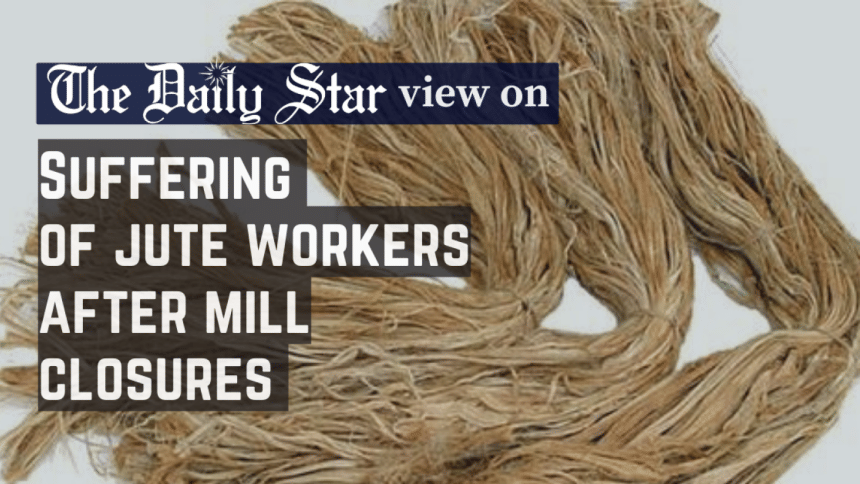End sufferings of laid-off jute workers

It's been two years since the closure of 25 jute mills operated by Bangladesh Jute Mills Corporation (BJMC) and the layoff of about 25,000 workers involved with them. This effectively marked the end of our state-run jute sector. How have the workers been faring since then? Although there has been no extensive research of the aftermath of the closure, a report by The Daily Star shows that promises made then are yet to come to fruition, to the detriment of both workers and this once-storied industry.
The report, based on a recent visit to at least four mills in Khalishpur, Khulna, highlights how some former workers have been passing their days in hardship, having tried other professions without success. The entire area looks like a "haunted" space, and there was no sign of activity with regard to the promised modernisation and reopening of mills under private or public-private arrangements.
One former substitute worker, now selling vegetables, detailed his struggles after losing his job of 23 years and being displaced from the workers' colony. He got only Tk 1,10,000 and no other benefits. Workers were promised due wages and benefits within "the quickest possible time", along with chances of retraining and reemployment when the mills are reopened. Whatever happened to those promises? So far, according to an official estimate, 14,351 workers out of 14,996 from the seven closed mills in Khulna got a golden handshake of Tk 1,352 crore (out of Tk 1,569 crore), while 13,339 substitute workers out of 14,078 had been given Tk 105 crore (out of Tk 109 crore). Apparently, strange as it may seem, confusion over name spellings halted payment to some workers.
Whatever the case, we're yet to have a full picture of the dues owed or paid to jute workers, not just in Khulna but in all the zones. There are reasons to doubt whether those would be paid in full or soon enough, given the history of exploitation of jute workers in Bangladesh. The predicament of laid-off workers, in simple terms, was caused by years of corruption, mismanagement and lack of vision by those running the sector. Will they ever be held accountable? Moreover, payment of dues was meant to be only part of the solution. What progress, if any, has been made in terms of the plan to reopen the mills after modernisation and reemploy former workers as promised?
The government must answer these questions and take better care of the workers. It should come up with an action plan about reopening all closed mills. We already have much of the physical infrastructure needed. If properly equipped with modern machinery and run with a vision, they can be a game-changer for Bangladesh.

 For all latest news, follow The Daily Star's Google News channel.
For all latest news, follow The Daily Star's Google News channel. 







Comments